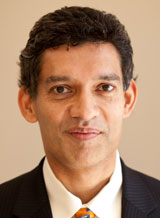
 Eswar Prasad is the Tolani Senior Professor of Trade Policy at Cornell University. He is also a Senior Fellow at the Brookings Institution, where he holds the New Century Chair in International Economics, and a Research Associate at the National Bureau of Economic Research. He was previously chief of the Financial Studies Division in the International Monetary Fund’s Research Department and, before that, was the head of the IMF’s China Division.
Eswar Prasad is the Tolani Senior Professor of Trade Policy at Cornell University. He is also a Senior Fellow at the Brookings Institution, where he holds the New Century Chair in International Economics, and a Research Associate at the National Bureau of Economic Research. He was previously chief of the Financial Studies Division in the International Monetary Fund’s Research Department and, before that, was the head of the IMF’s China Division.
Prasad has testified before various U.S. Congressional committees, including the Senate Finance Committee and House Committee on Financial Services. He was a member of the analytical team that drafted the 2008 report of the High-Level Committee on Financial Sector Reforms set up by the Government of India. He serves on an Advisory Committee to India’s Finance Minister and is the Lead Academic for the DFID-LSE International Growth Center’s India Growth Research Program. He is the creator of the Brookings-Financial Times index of world economic activity (TIGER: Tracking Indices for the Global Economic Recovery; www.ft.com/tiger). His op-ed articles have appeared in the Financial Times, Harvard Business Review, International Herald Tribune, New York Times, Wall Street Journal, Washington Post, and numerous other newspapers.
Eswar Prasad’s previous book, Emerging Markets: Resilience and Growth Amid Global Turmoil (with M. Ayhan Kose; Brookings Institution Press), was published in December 2010. His extensive publication record includes articles in top academic journals as well as numerous collected volumes. He has co-authored and edited numerous books and monographs, including on financial regulation and on China and India. His research interests include the macroeconomics of financial globalization; financial regulation, monetary policy frameworks and exchange rate policies in emerging markets; and the Chinese and Indian economies.
About The Dollar Trap: How the U.S. Dollar Tightened Its Grip on Global Finance
The U.S. dollar’s dominance seems under threat. The near collapse of the U.S. financial system in 2008-2009, political paralysis that has blocked effective policymaking, and emerging competitors such as the Chinese renminbi have heightened speculation about the dollar’s looming displacement as the main reserve currency. Yet, as The Dollar Trap powerfully argues, the financial crisis, a dysfunctional international monetary system, and U.S. policies have paradoxically strengthened the dollar’s importance.
Eswar Prasad examines how the dollar came to have a central role in the world economy and demonstrates that it will remain the cornerstone of global finance for the foreseeable future. Marshaling a range of arguments and data, and drawing on the latest research, Prasad shows why it will be difficult to dislodge the dollar-centric system. With vast amounts of foreign financial capital locked up in dollar assets, including U.S. government securities, other countries now have a strong incentive to prevent a dollar crash.
Prasad takes the reader through key contemporary issues in international finance–including the growing economic influence of emerging markets, the currency wars, the complexities of the China-U.S. relationship, and the role of institutions like the International Monetary Fund–and offers new ideas for fixing the flawed monetary system. Readers are also given a rare look into some of the intrigue and backdoor scheming in the corridors of international finance.
The Dollar Trap offers a panoramic analysis of the fragile state of global finance and makes a compelling case that, despite all its flaws, the dollar will remain the ultimate safe-haven currency.



